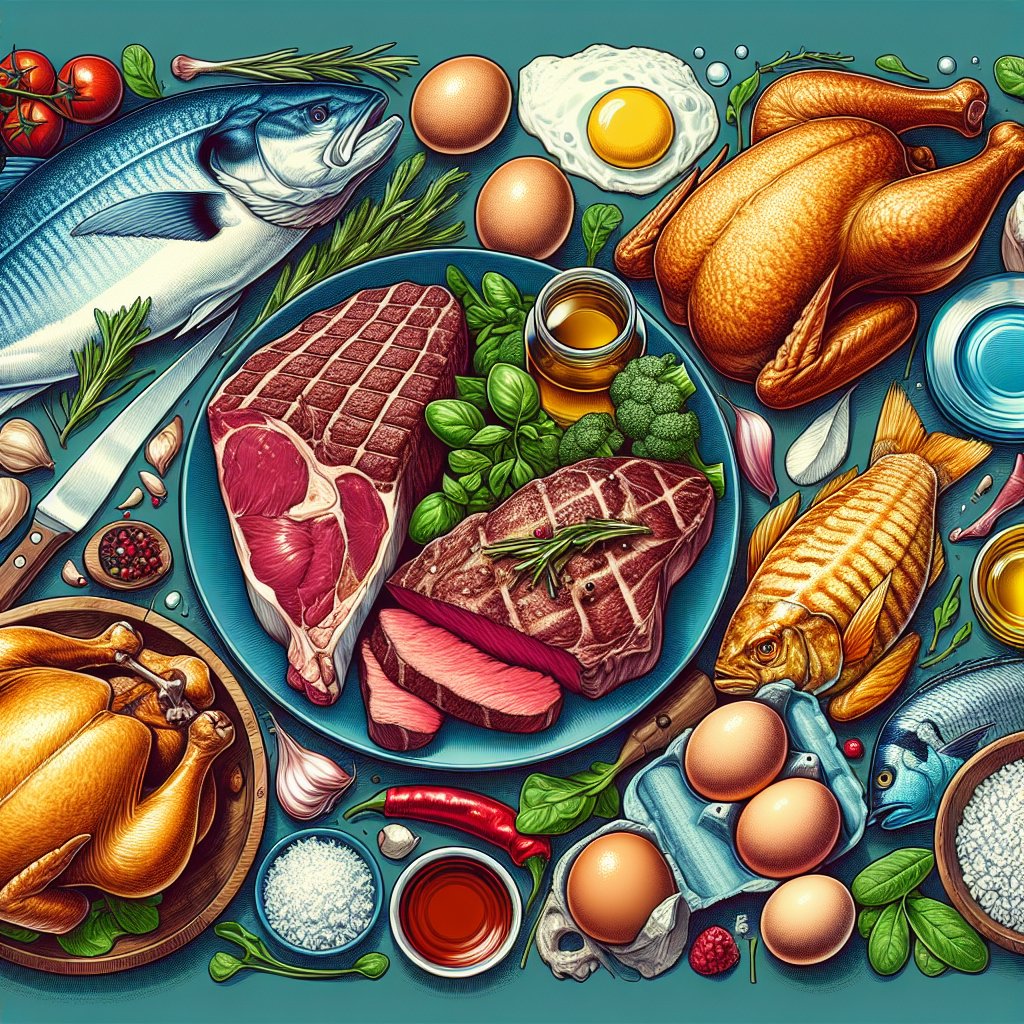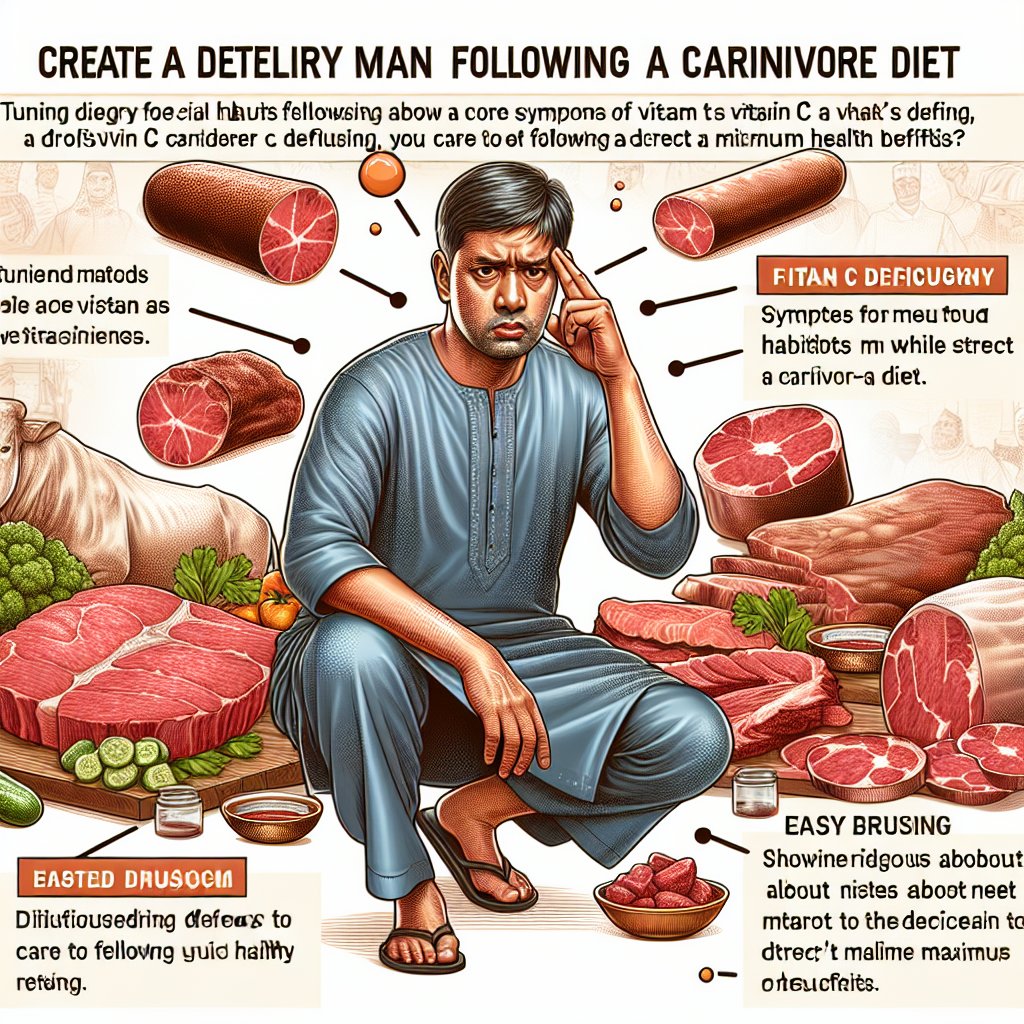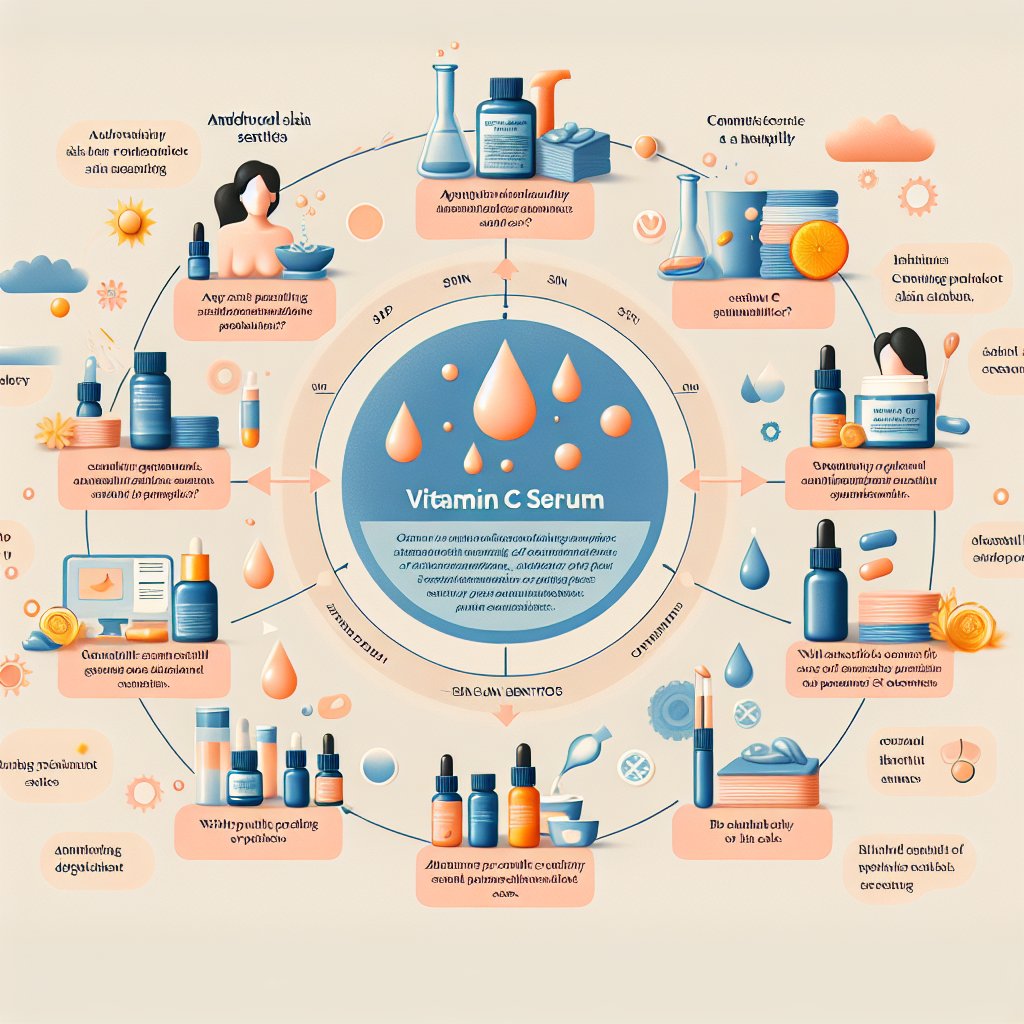Unveiling the Secrets of the Carnivore Diet: Ensuring Vitamin C Balance for Maximum Health Benefits!
Unveiling the Secrets of the Carnivore Diet: Ensuring Vitamin C Balance for Maximum Health Benefits!
Welcome to our deep dive into the fascinating world of the carnivore diet! Whether you’re new to this lifestyle or a seasoned follower, we’ll be exploring the ins and outs of this unique approach to nutrition and health. So, what exactly is the carnivore diet? It’s an eating plan that focuses on consuming animal-based foods, while excluding plant-based items. This diet has gained significant attention due to its potential health benefits and the intriguing scientific discussions surrounding it.
Understanding the Carnivore Diet
The carnivore diet, also known as the zero-carb diet, follows a strict regimen of consuming only animal-derived foods. This includes meat, fish, eggs, and certain dairy products. While it might sound extreme to some, proponents of the diet claim that it can lead to weight loss, improved mental clarity, and even relief from certain health conditions. What makes this diet truly stand out is its complete exclusion of plant-based foods, which goes against conventional dietary guidelines.
Individuals on the carnivore diet often choose to follow it for various reasons, such as autoimmune conditions, digestive issues, or simply as an experiment to see how their bodies respond. It’s essential to note that the carnivore diet is not the same as a standard ketogenic diet, which allows for a moderate intake of carbohydrates primarily from non-starchy vegetables. The carnivore diet is a more extreme version where plant foods are entirely eliminated.
The Focus on Animal-Based Foods
One of the primary aspects of the carnivore diet is its emphasis on animal-derived foods. Meat, in particular, is considered the cornerstone of this eating plan. Contrary to common misconceptions, animal-based foods provide a rich source of essential nutrients such as protein, B vitamins, and minerals like zinc and iron.
Research has shown that animal products contain high-quality proteins that are rich in essential amino acids, necessary for muscle maintenance and overall health. Additionally, these foods provide ample amounts of vitamin B12, a nutrient that is predominantly found in animal-based sources and is crucial for nerve function and red blood cell production.
In further delving into the nuances of the carnivore diet, we’ll explore how it balances the intake of essential nutrients, including the much-debated topic of vitamin C. Join us as we uncover the secrets of this fascinating and unconventional dietary approach.

Benefits of the Carnivore Diet
So, you’ve heard about the carnivore diet, and you’re curious about its potential benefits. Let’s dive into the amazing advantages of this meat-based eating regimen!
Improved Nutrient Absorption
Research has shown that animal-based foods are highly bioavailable sources of essential nutrients, particularly vitamin C. In fact, contrary to the belief that vitamin C can only be obtained from fruits and vegetables, it’s worth noting that organs and muscle meats from animals are rich in this important nutrient. By embracing the carnivore diet, individuals can benefit from improved nutrient absorption, as the body can more efficiently utilize the vitamin C from these animal sources.
Enhanced Immune Function
Vitamin C is renowned for its immune-boosting properties. A study published in the “Nutrients” journal revealed that adequate vitamin C intake is crucial for supporting various immune functions in the body, such as enhancing the cellular functions of both the innate and adaptive immune systems. By ensuring a balanced intake of vitamin C through the carnivore diet, individuals can strengthen their immune system and reduce the risk of infections and illnesses.
Optimized Skin Health
Another remarkable benefit of the carnivore diet is its potential to support optimal skin health. Vitamin C plays a pivotal role in the synthesis of collagen, a protein essential for maintaining the firmness and elasticity of the skin. According to a study in the “Nutrients” journal, vitamin C contributes to skin health through its antioxidant properties and its involvement in collagen formation. By incorporating vitamin C-rich animal-based foods into the diet, individuals can promote vibrant and youthful-looking skin.
Improved Oral Health
Believe it or not, the carnivore diet can also positively impact oral health, thanks to its vitamin C content. A study in the “Journal of Periodontology” highlighted the role of vitamin C in supporting gum and tooth health. The vitamin C found in animal-based foods promotes gum tissue strength and helps in maintaining healthy teeth and gums. By following a well-balanced carnivore diet, individuals can potentially reduce the risk of periodontal issues and maintain a healthy smile.
As you can see, the carnivore diet offers a plethora of potential benefits, especially when it comes to ensuring adequate intake of essential nutrients like vitamin C. Whether it’s for immune support, skin health, or overall vitality, incorporating vitamin C-rich animal-based foods into your diet can lead to a range of positive impacts on your health and well-being.
Vitamin C Importance
When it comes to the carnivore diet, a nutrient that often comes into question is vitamin C. This vital nutrient plays a crucial role in the body’s overall health and well-being. Let’s explore the significance of vitamin C and its sources, ensuring that we maintain a balanced intake for maximum health benefits.
Key Role in the Body
Vitamin C, also known as ascorbic acid, is an essential nutrient that serves several important functions in the body. It acts as a powerful antioxidant, protecting cells from damage caused by free radicals. Moreover, vitamin C is vital for the production of collagen, a protein that is essential for wound healing and maintaining the structure of the skin, bones, and muscles.
Research has also indicated that vitamin C plays a role in supporting the immune system and may help reduce the duration and severity of colds. Additionally, it enhances the absorption of non-heme iron, the type of iron found in plant-based foods, which is particularly relevant for individuals following a primarily carnivorous diet.
Sources of Vitamin C
While it’s commonly associated with fruits and vegetables, individuals following a carnivore diet can still obtain adequate levels of vitamin C from certain animal-based sources. Organ meats, such as liver and kidneys, are rich in vitamin C. For instance, a 100g serving of beef liver can provide more than the recommended dietary allowance (RDA) for vitamin C.
Furthermore, some animal fats, such as lard, also contain small amounts of vitamin C. However, it’s important to note that the vitamin C content in animal-based sources might degrade with cooking. Therefore, incorporating raw or minimally cooked organ meats into the diet can help ensure the intake of this essential nutrient.
While plant foods are restricted on the carnivore diet, if you choose to include a small amount of low-carb plant foods for variety, there are a few options that are relatively low in carbohydrates and can contribute to vitamin C intake. For example, bell peppers and certain leafy greens, such as spinach and kale, contain vitamin C and can be consumed in limited quantities while still adhering to the principles of the carnivore diet.
In addition to dietary sources, vitamin C supplements can also be considered to fill potential gaps in meeting the recommended intake, especially for those who may have specific dietary restrictions or limited access to fresh animal-based products.
Ensuring an adequate intake of vitamin C is essential for overall health, and it’s reassuring to know that there are viable sources of this nutrient available for individuals following a carnivore diet.
Now that we understand the importance of vitamin C and its sources, we can confidently incorporate these insights into our carnivore diet for maximum health benefits.
Detailing the risks of vitamin C deficiency on a carnivore diet
When it comes to the carnivore diet, there’s a lot of buzz around its potential health benefits. However, it’s crucial to be aware of the risks associated with potential vitamin C deficiency when following this dietary approach.
While vitamin C is commonly found in fruits and vegetables, it’s significantly lower in animal products. As a result, individuals on a strict carnivore diet may be at risk of not meeting their vitamin C requirements. This could potentially lead to a condition known as scurvy, which is primarily caused by vitamin C deficiency.
Research has shown that vitamin C plays a critical role in the body’s ability to synthesize collagen, a protein essential for connective tissues, skin, and joint health. A deficiency in vitamin C can lead to symptoms such as fatigue, joint pain, easy bruising, and impaired wound healing.
Given these risks, it’s important for individuals following a carnivore diet to be proactive in ensuring they meet their vitamin C needs through alternative sources. This can be achieved by incorporating organ meats such as liver, which are rich in vitamin C, or considering vitamin C supplementation under the guidance of a healthcare professional.
Furthermore, incorporating small amounts of certain low-carb vegetables such as bell peppers and spinach can also provide an additional source of vitamin C without significantly impacting the macronutrient composition of the carnivore diet.
It’s important to emphasize that while the carnivore diet has its merits, being mindful of potential nutrient deficiencies such as vitamin C can contribute to a more balanced and sustainable approach to this dietary regimen.

Managing Vitamin C Intake on Carnivore Diet
While the carnivore diet primarily consists of animal products, it is essential to ensure sufficient vitamin C intake to maintain optimal health. Contrary to popular belief, it is possible to meet the body’s vitamin C requirements through carefully selected animal-based strategies.
The Role of Vitamin C on a Carnivore Diet
Vitamin C is a vital nutrient that supports various bodily functions, including the growth and repair of tissues, collagen production, and immune system health. On a carnivore diet, obtaining adequate vitamin C is crucial to prevent deficiencies and support overall well-being.
Strategies for Ensuring Vitamin C Intake
Despite the absence of plant-based sources of vitamin C in the carnivore diet, there are several effective strategies to ensure sufficient intake:
Organ Meats
Organ meats, such as liver and kidneys, are rich in vitamin C. Incorporating these nutrient-dense organ meats into your carnivore diet can significantly contribute to meeting your vitamin C needs. For instance, a 3-ounce serving of beef liver contains approximately 27 mg of vitamin C, which is more than enough to meet the daily requirement.
Fresh, Unaged Animal Products
Consuming fresh, unaged animal products can also provide small amounts of vitamin C. Raw meat, raw fish, and unaged raw dairy products contain some vitamin C, which can contribute to your overall intake on a carnivore diet.
Bone Marrow
Adding bone marrow to your carnivore diet can offer additional vitamin C. Bone marrow, a rich and flavorful component of animal bones, contains nutrients, including vitamin C, that can further support your dietary needs.
Supplementation
In some cases, supplementation may be necessary to ensure optimal vitamin C intake on a carnivore diet. While it is generally ideal to obtain nutrients from whole foods, high-quality vitamin C supplements can serve as a reliable backup to meet any potential deficiencies.
It’s important to consult with a qualified healthcare professional before starting any supplementation regimen to determine the appropriate dosage and ensure it aligns with your individual health needs.
Conclusion
With careful planning and strategic food choices, it is entirely feasible to maintain adequate vitamin C levels while following a carnivore diet. By incorporating nutrient-rich organ meats, fresh animal products, bone marrow, and, when necessary, high-quality supplements, individuals can optimize their vitamin C intake and support their overall health on this unique dietary path.
Summarizing the Importance of Addressing Vitamin C Needs on a Carnivore Diet
As we wrap up our exploration of the carnivore diet and its impact on vitamin C intake, it’s crucial to emphasize the significance of addressing vitamin C needs while following this dietary approach.
Research has shown that vitamin C plays a vital role in supporting overall health and well-being. While it’s commonly associated with fruits and vegetables, individuals following a carnivore diet can still find sources of this essential nutrient within their food choices. Incorporating vitamin C-rich organ meats like liver and kidney, as well as consuming fresh, uncooked meats, can help maintain optimal vitamin C levels.
However, it’s essential for individuals on a carnivore diet to be mindful of their vitamin C intake, as deficiency in this nutrient can lead to scurvy, a condition characterized by fatigue, inflammation, and impaired wound healing. To ensure maximum health benefits, carnivore dieters should prioritize consuming high-quality, nutrient-dense animal products that provide essential vitamins and minerals, including vitamin C.
By paying attention to their vitamin C intake and diversifying their animal-based food choices, individuals can thrive on a carnivore diet while meeting their nutritional needs. Additionally, consulting with a healthcare professional or registered dietitian can provide personalized guidance on optimizing vitamin C intake within the constraints of a carnivore diet. With a well-informed approach, individuals can harness the benefits of the carnivore diet while ensuring their vitamin C balance for maximum health and wellness.


